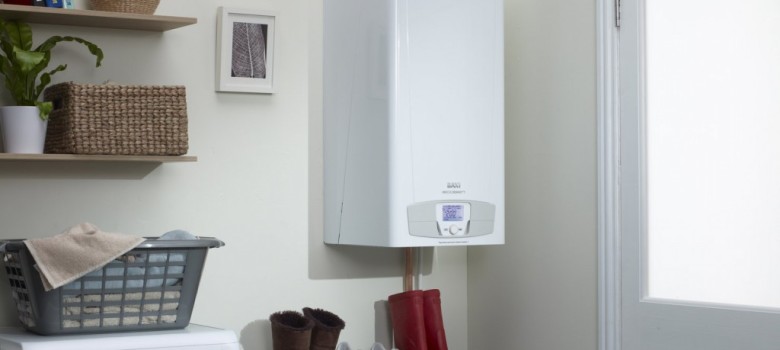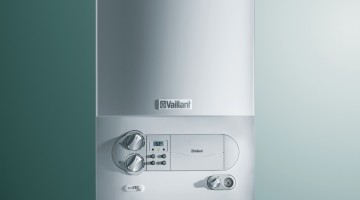
The CHP boilers – or domestic micro CHP – is a new type of boiler available for homes. This guide answers all your burning questions and looks at whether these boilers are a worthwhile investment.
Every time we come out of a spell of warm weather and look to heat our homes, we turn to our boilers. Now, there is always that moment of trepidation as I fire up the boiler for the first time as to whether or not the heating system will actually work. Obviously if your system has given you issues in the past or is an older system (10 years old or more) then it may be time for a complete boiler overhaul.
If this is the case you will probably be thinking about replacing the old unit with a like-for-like new condensing unit; however a CHP boiler will provide you with electricity as well as heat, so it may be worth considering. In this blog we look at them in a bit more detail to help you make up your mind.
What is a CHP boiler?
CHP technology is not a new concept, but in the domestic setting, it is something that has only recently become relevant to UK consumers.
We discuss the specific technical aspects of CHP boilers in a bit. Essentially, a CHP boiler will produce your heating requirements just like a normal boiler, but in the process collect the gases to drive an internal generator, creating electricity. The electricity created is then fed back into your property and can power lights and appliances for free as long as enough energy is produced.
Are CHP boilers available for homes?
The answer is yes. Up until now CHP has only really been used in commercial applications. However the introduction of the Stirling engine powered micro-CHP boilers has opened this technology up to households. They are suitable for this operation as they are compact and less noisy than other technological solutions.
There are internal combustion CHP units that operate more efficiently in terms of combustion to electricity generation output; however they tend to be very noisy when operating, large in size, and more suitable for large buildings and commercial spaces.
In addition, fuel cell technology has been used to develop prototypes that may one day become commercialised, but we are probably another 5 years or so from this becoming a viable option.
What size of home is suitable for a micro CHP unit?
The most popular micro-CHP boiler available in the UK today is the Baxi Ecogen, and this wall mounted unit is 950mm tall and 450mm wide. This makes it about a third bigger in size than a traditional regular boiler – but only marginally bigger than a system or combi boiler.
The boiler itself can adjust its heating output to match a heating requirement of 23KW, therefore matching the performance of a regular-sized boiler that would be used to power a 3 bed home. Plus it will produce electricity at the same time!
The Vitali and Viesmann CHP units are probably more suitable for multi dwelling properties.
Financial benefits of a CHP boiler
Since micro-CHP boilers produce electricity, they benefit from the Feed-in Tariff. Check our regularly updated technology pages for current rates of payment.
In addition to earning some income through Feed-in Tariff payments, the CHP unit will also produce electricity whenever it is producing heat (either for heating or hot water). Since people tend to have their heating on when they wake up and when they come home in the evenings, the CHP unit will produce electricity to match peak demand requirements. Therefore this obviously reduces the amount of electricity that needs to be purchased from the National Grid.
Having said that, the micro-CHP unit will also export electricity when you are not using it in the home. So if you like to leave the heating on at night or during the day when you don’t run lights or appliances, the excess will earn you a few extra pennies.
According to the Baxi product specification, their Ecogen product could potentially save £600 off your energy bills per year vs. a G rated boiler (SEDBUK 65% seasonal efficiency) and cut carbon dioxide emissions by as much as 40%.
It is important to remember though that if the boiler isn’t turned on, then you will produce zero electricity.
Current CHP boiler units on the Market
Baxi Ecogen 24/1.0
The Baxi Ecogen has been available in the UK market since 2010 and is an MCS-approved product. The units can now be sourced separately through wholesale companies or specifically ordered and installed with British Gas. The Baxi Ecogen can be powered by both mains gas or LPG. The gas unit retails at c£7,400 (inclusive of VAT) and the LPG unit at c£8,000 – this doesn’t include installation costs, which would have to be undertaken by an MCS accredited installer and a gas safety engineer.
On the other hand, British Gas has been readily installing these units since 2011, so it may be worth giving them a call and finding out if there is a subsidised deal that could potentially bring the cost down.
Vitali Energi
Vitali Energi on the other hand doesn’t have an ‘off-the-shelf’ product as what they manufacture is customised dependent on the size of the property. The units are not cheap and would be more suited to large properties and commercial buildings.
Viesmann CHP
The Vitotwin 300-W is the domestic CHP product developed by Viesamann and currently sold in Germany, but yet to be distributed in the UK. The boiler unit is also a condensing cylinder, allowing it to operate at 96% efficiency.
Whispergen Micro CHP
At the end of 2012, E.ON announced a partnership deal with EHE to potentially launch the Whispergen micro CHP unit in the UK. However soon after this announcement, the plans were shelved (due to the viability of this product for the UK market) and no further plans to launch this product were put in place. Seasonal efficiency figures for the two prototype units produced are still available on the SEDBUK database, even though the models were never distributed en masse to people’s homes.
CHP boilers – are they worth it?
Domestic CHP units like the Baxi Ecogen or the Viesmann Vitotwin 300-W are powered by a stirling engine, which has the capability of producing 1kW of electrical output when the boiler is working at maximum capacity.
In reality this means that the boiler will to some degree help out with electricity consumption during peak load times, for example powering your entertainment system and lights. However as soon as you try and turn on an electricity-guzzling appliance like an oven, tumble dryer or washing machine, the electricity generated will not be enough and the additional requirements will have to be pulled from the grid.
Also when there is little heating demand and in the summer, the boiler in theory will not be generating that much electricity.
According to Baxi, the incremental cost of an Ecogen vs. a current A-rated condensing unit is £3,000. However we think this is slightly underestimated as the unit itself currently retails just under £8,000 excluding installation cost (£8,500 or more including installation cost). A new condensing boiler, install plus parts can be sourced for £2,500, which means that incremental cost is actually over £6,000 with a payback of over 10 years – this means the payback period (5 -6 years) previously quoted in other articles is too generous.
Verdict: if you already have an A or B–rated condensing unit, then the CHP is just not worth it. If, however, you have a fairly big uninsulated house then the CHP could be an option – however it is not as good as an air source heat pump or a biomass boiler, which benefit from the Renewable Heat Incentive.
Installing a CHP boiler – what else do I need to know?
A few things to bear in mind if you have chosen a CHP boiler:
- The installation will need to be performed by a qualified MCS installer and a gas safety registered engineer.
- The installation surface needs to be uninhibited by other objects.
- The wall needs to be able to support the unit weight and when it is filled with water, which will make it slightly heavier
- Usually have an electricity generating meter displayed on the unit.
- Once the unit is installed you need to notify your electricity supplier so they have somewhere to send the Feed-in Tariff payments!
Installing Micro CHP?
Interested in installing a micro CHP boiler? We have scoured the country for the best tradespeople, so that we can make sure we only recommend those we really trust.
If you would like us to find you a local installer to help install micro CHP in your home, just fill in the form below and we will be in touch shortly!
Think we missed something? Do you have a different opinion?
Comment below to get your voice heard…












Really helpful info, thanks for sharing.
Not sure if I my message transmitted, I am interested in the newly realeased Flow mCHP boiler. Are you landing to include this in your review. I did get a quote years ago for a Baxi Ecogen from BG but gave up when the quote came out at £8500. The Flow boiler looks a lot more affordable?
Tony, there are a couple of options when looking at the Flow mCHP boiler. But if you were to buy one it would cost around £3675, you are then locked into their tariffs and over the course of 5 years you can receive £4800 off your bills.
Am I right in thinking the Flow Energy tariffs compare very favourably with the other big suppliers so it could be a win-win situation. Is there a meter to determine how much electricity is put back into the grid.
Hi Robert – the issue with CHP is that you are only creating minimal electricity since the boiler needs to be firing up to run it. We have also heard to a few people who have tried to get these installed and the ‘conditions’ are not suitable. I think CHP boilers time will come, but it will be when Time of Use tariffs come into play and you can actually make a decent return from running the boiler at particular times for exporting the electricity back to the grid. If you look at all the big boys, they are yet to venture into the CHP market (with the exception of a brief showing from Baxi) so I think that speaks volumes to be honest!
I have just had a quote from Flow Energy for their new mCHP boiler that is brand new. The last blogger correctly identifies that it is £3675 plus fitting of £1742. However they are currently offering £1000 off if you register for the offer and also get 5 year warranty and 4 year service for free. Also if you agree to let Flow Energy have the feed in tariff for 5 years tgey will pay you £80 a month for 5 years totalling £4800.
On the face of it i will be getting a free boiler and get the electicity to use for free. Then after 5 years the feed in tariff is payable to me for another 15 years.
What i do not know is the reliability of the boiler itself, but i think tgat i am going to take the risk!
James. The money you get for export is trivial especially since with mCHP, you will have burned gas to generate it. e.g. you pay 3.5p/kWh to burn gas at 90% efficiency to get 4.77p/kWh export tariff….not much more than a penny/kWh.
The real saving comes when you actually use the electricity generated directly because you save the spark gap amount (difference between electricity rate and gas rate) amounting to about 10p/kWh PLUS you get the feed in tariff subsidy of about 13.5p/kWh. This is a total around 23.5p/kWh saving on electricity generated that you use directly.
With the Flow deal this combined saving goes to Flow which enables them to guarantee the £80/month bill reduction. If the boiler proves to be reliable it seems a sweet deal.
Hi Paul,
Time of use tariffs are not in play yet – they are a means of forcing people to pay through the nose for electricity at peak times with a view to curbing demand. I.e. 50 / 60 p / kWh at 7pm. This is what I am talking about since then it definitely becomes worth doing. You fire up your CHP boiler to heat your water and you get paid a substantial amount to export it – not the 4.77p you mentioned above.
Your text suggests that CHP boilers will still qualify for FIT.
We have a CHP boiler but we have been told we are no longer eligible. How is it possible for new CHP installations to qualify?
Are there any CHP boilers available which will work during a power cut, or indeed in a property which has a gas supply but no electricity supply?
CHP boilers are designed to work in a power cut, if already on. You wouldn’t be able to initially turn it on during a power cut, however, unless would need some kind of battery storage solution! If there is no electricity supply, it will not work without a battery pack.
Whilst you are partially correct about the need for MCS and Gas Safe Registered installers this only applies to gas fited units installed for monetary gain. There is no requirement for Gas Safe Registered installers for oil fired units and if, as I am, you have installation experience there is no legal requirement to be Gas Safe Registered if you are not receiving payment i.e. you are doing it in your own house or for family. That said I would like more information on the availability of oil fired units for domestic properties